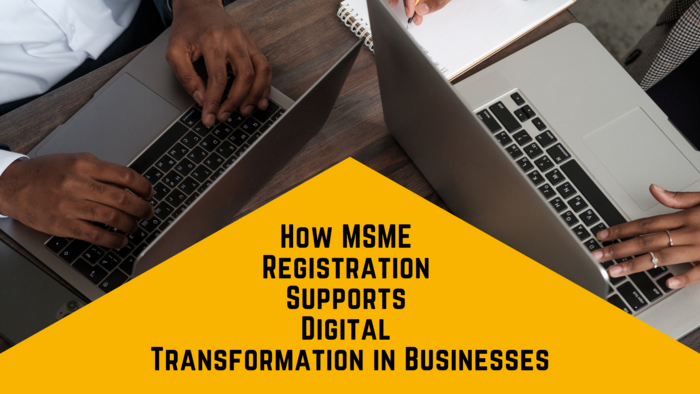
Introduction:
In today’s rapidly evolving business landscape, digital transformation has become imperative for companies, irrespective of their size. Micro, Small, and Medium Enterprises (MSMEs) play a pivotal role in the economy, and embracing digital technologies is essential for their survival and growth. MSME registration not only provides businesses with legal recognition but also serves as a catalyst for their digital transformation journey. This article explores the ways in which Udyam registration supports and accelerates the digital transformation of businesses.
Benefits of MSME Registration in Digital Transformation:
Access to Government Initiatives and Subsidies:
MSME registration grants businesses access to various government schemes and subsidies aimed at promoting digital adoption. These incentives can significantly reduce the cost of implementing digital technologies, making it more feasible for MSMEs to invest in automation, cloud computing, and other digital solutions.
Financial Support and Credit Facilitation:
MSME registration enhances a business’s credibility, making it easier to secure loans and financial support from banks and financial institutions. These funds can be utilized for digital transformation initiatives, such as building e-commerce platforms, implementing customer relationship management (CRM) systems, or upgrading cybersecurity measures.
Technology Adoption and Skill Development:
MSME registration often comes with training programs and workshops conducted by government bodies. These programs focus on educating entrepreneurs about emerging digital technologies, best practices, and skill development. By acquiring relevant knowledge and skills, MSMEs can effectively integrate digital tools into their operations.
Market Expansion through Online Platforms:
Digital platforms have transformed the way businesses reach their customers. MSMEs, after registration, can leverage online marketplaces and social media platforms to expand their customer base. E-commerce platforms enable MSMEs to showcase their products or services to a global audience, leading to increased sales and revenue.
Streamlining Operations and Enhancing Efficiency:
Digital technologies such as enterprise resource planning (ERP) systems, inventory management software, and automation tools help MSMEs streamline their operations. By automating repetitive tasks and centralizing data, businesses can improve efficiency, reduce operational costs, and deliver better customer experiences.
Empowering Workforce and Enhancing Productivity:
Digital transformation not only reshapes businesses but also empowers the workforce. MSMEs, with the aid of digital tools and technologies, can provide their employees with online training programs and upskilling opportunities. Cloud-based collaboration platforms enable remote work, fostering a flexible work environment and attracting top talent from diverse geographical locations. Enhanced productivity tools automate mundane tasks, allowing employees to focus on more strategic and creative aspects of their jobs. This empowerment of the workforce leads to higher job satisfaction, increased efficiency, and overall business growth.
Embracing Artificial Intelligence and Big Data Analytics:
MSME registration acts as a gateway for businesses to explore advanced technologies like Artificial Intelligence (AI) and Big Data Analytics. AI-powered chatbots handle customer queries, virtual assistants streamline administrative tasks, and predictive analytics provide valuable insights into market trends and consumer behavior. MSMEs can harness these technologies to make data-driven decisions, optimize supply chains, and personalize customer experiences. By leveraging AI and Big Data, businesses gain a competitive edge, driving innovation and improving operational efficiency.
Sustainable Practices and Green Technologies:
Digital transformation in MSMEs extends beyond efficiency and innovation—it also plays a pivotal role in promoting sustainability. Cloud computing reduces the need for physical infrastructure, cutting down on energy consumption. Furthermore, digital documentation and communication significantly reduce paper usage, contributing to environmental conservation. MSMEs, after registration, can access green technologies that help minimize their carbon footprint, fostering a responsible and eco-friendly business environment. Embracing sustainable practices not only benefits the environment but also enhances the company’s reputation, attracting environmentally conscious consumers and investors.
Real-time Decision Making and Agility:
In the digital age, speed is of the essence. Digital transformation enables MSMEs to collect, process, and analyze data in real-time. This rapid access to information empowers businesses to make timely and informed decisions, respond swiftly to market changes, and capitalize on emerging opportunities. The agility facilitated by digital technologies allows MSMEs to adapt their strategies quickly, ensuring they remain relevant and competitive in today’s fast-paced business landscape.
Suggested Read- Udyam Registration Form
Conclusion:
Incorporating digital transformation into their operations is no longer a choice for MSMEs—it is a necessity. MSME registration acts as a facilitator, opening doors to a plethora of opportunities that aid in the seamless integration of digital technologies. From financial support to skill development and market expansion, the benefits of MSME registration empower businesses to embrace the digital age with confidence.
By recognizing the symbiotic relationship between MSME registration and digital transformation, businesses can harness the full potential of technology, driving innovation, competitiveness, and sustainable growth. As MSMEs continue to evolve digitally, they not only secure their future but also contribute significantly to the economic progress of nations worldwide.


